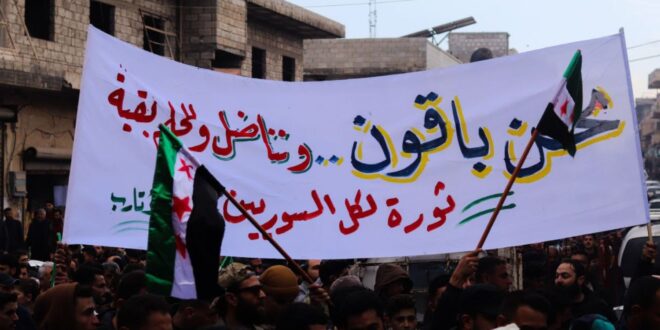The Syrian Islamic Council supported the popular movement in various towns and cities of northwest Syria, led by activists and civilians since February 26.
In a statement published by the Council regarding the demonstrations, it said that it has been monitoring the protests against injustice and tyranny since their inception.
The Council added that it “takes pride in its affiliation with the free revolutionaries and values this popular movement in all its forms, from demonstrations to sit-ins and legitimate protests, considering it a legitimate right for all citizens,” pointing out that “the people did not rise up against the corrupt, unjust, and criminal ruling gang only to replace them with another unjust and corrupt gang.”
The Syrian Islamic Council emphasized the criminalization of all forms of injustice, including unlawful imprisonment, torture, imposing taxes, and overriding the judiciary’s authority.
The Council continued in its statement to condemn the oppressors and calls for their accountability for their actions, noting its non-acceptance of justifications under any pretext.
The Council sees that “the way out of this situation requires the selection of a competent leadership that emanates from the free will of the people, which necessitates reviving the real and effective role of the revolutionary elite.”
The demonstrations in northwest Syria carried demands for the downfall of the leader of Hayat Tahrir al-Sham (HTS), Abu Mohammad al-Jolani, and the rejection of the body’s policy, which has control in Idlib, as well as the release of detainees.
The demonstrations come after a state of anger amongst civilians and military personnel in Idlib, following the death of a member of the Ahrar al-Sham brigade in the prisons of Tahrir al-Sham, due to torture on the background of alleged “treason,” which has blown through the HTS ranks for a year now.
Hayat Tahrir al-Sham and its political umbrella, the Syrian Salvation Government (SSG), have launched several promises and reforms, including a conditional general amnesty with exceptions, the formation of committees to listen to the people, the cancellation of building fees, and exemptions from them under certain conditions. However, this did not prevent the emergence of demonstrations.
The Minister of Interior in the Salvation Government, Mohammed Abdul Rahman, stated that the ministry has released 420 prisoners pursuant to the amnesty decree, threatening to release more numbers included in the amnesty.
The Salvation Government, composed of 11 ministries, controls the life aspects in Idlib province and the northern countryside of Hama, and a part of the western countryside of Aleppo, administratively and service-wise, while Tahrir al-Sham indirectly controls the region economically and in terms of services.
 Eurasia Press & News
Eurasia Press & News



